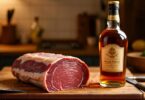【经】:「欲生彼国者,当修三福。
[1] 一者,
[i] 孝养父母 ,
[ii] 奉事师长,
[iii] 慈心不杀,
[iv] 修十善业。…
如此三事名为「净业」。」
佛告韦提希:「汝今知不?此三种业乃是过去、未来、现在,三世诸佛净业正因。」
[Sūtra]: ‘Those desiring birth [in] that [Pure] Land [of Āmítuófó], should cultivate Three Blessings.
[1] First, [is to]
[i] [have] filial support [of their] Fathers [and] Mothers,
[ii] attend [to their] teachers [and] seniors,
[iii] [with] loving-kindness’ mind not kill, [and]
[iv] cultivate [the] Ten Good Karmas [i.e. Ten Wholesome Deeds]…
Thus, these three matters, [are] named [as] “pure karmas”.’
[Śākyamuni] Buddha told Vaidehī, ‘[Do] you now know [this] or not? These three kinds [of] karmas precisely are, [in the] past, future [and] present, [the] three periods’ all Buddhas’ pure karmas’ right causes.‘
【疏】:… 言「孝养父母」者,此明一切凡夫皆藉缘而生。
[Commentary]: … [S]peaking [of] those [i] ‘[have] filial support [of their] Fathers [and] Mothers’, this [is with] understanding [that] all ordinary beings all relied upon conditions then born.
云何藉缘?或有化生,或有湿生,或有卵生,或有胎生。此四生中,各各复有四生,如经广说。
What is [to have] relied upon conditions? Perhaps having manifested births, or having moisture births, or having egg births, or having womb births. These four births within, each personally repeatedly have [these] four births, as [the] sūtras extensively say.
但是相因而生,即有父母 ;既有父母,即有大恩。
However, [as we are with their] complementing causes then born, then having Fathers [and] Mothers. Since having Fathers [and] Mothers, then having [their] great kindness.
若无父者,能生之因即阙 ;若无母者,所生之缘即乖 ;若二人俱无,即失托生之地。
If [as] those without Fathers, [the] cause of [the] ability [to be] born [is] then deficient. If [as] those without Mothers, [the] condition of [their] births [is] then separate. If [these] two persons [are] completely lacking, then lost [is the] ground of giving birth.
要须父母缘具,方有受身之处。
[We] must have Fathers’ [and] Mothers’ conditions [to be] complete, then having possibility of receiving [our] bodies.
既欲受身,以自业识为内因,以父母精血为外缘,因缘和合,故有此身。
Since desiring [to] receive [our] bodies, with personal karmic consciousness as internal cause, [and] with Fathers’ [and] Mothers’ sperm [and] eggs as external conditions, cause [and] conditions harmonise together, thus having these bodies.
以斯义故,父母恩重。
With that meaning thus, [our] Fathers’ [and] Mothers’ kindness [is] heavy.
母怀胎已,经于十月,行住坐卧,常生苦恼,复忧产时死难。
[Our] Mothers, [having] carried [us in their] wombs already, passing by ten months, [when] moving, standing, sitting [and] lying down, often gave rise [to] suffering [and] afflictions, repeatedly worrying [that] when giving birth, [having our] accidental deaths.
若生已,经于三年,恒常眠屎卧尿,床被衣服皆亦不净。
If born already, passing by three years, [they] frequently slept [where there is] faeces [and] laid [where there is] urine, [to make space for their children, where they did not soil or wet, with] beds, blankets [and] clothes all also not clean, [as they were dirtied by their children, or with no time to clean them].
及其长大,爱妇亲儿,于父母处,反生憎疾,不行恩孝者,即与畜生无异也。
As well as [when] grown up, loving [husbands], wives [and our] own children, at [where our] Fathers [and] Mothers dwell, instead giving rise [to] hatred swiftly, those not practising kind filial piety, then with animals, [are] without difference.
又父母者,世间福田之极也。
Also, those [who are] Fathers [and] Mothers, [are the] most [fertile] of worldly blessing fields [i.e. fields of merits].
 [How The Buddha Redirected A Precious Offering]:
[How The Buddha Redirected A Precious Offering]:
佛者,即是出世福田之极也。
The Buddha, is [the] utmost of world-transcending blessing fields.
然佛在世时,遇值时年饥俭,人皆饿死,白骨纵横。
However, when [the] Buddha [was] in [the] world, [he] happened to encounter that [certain] year’s famine, [with] people all starving [to] death, [with their] white bones criss-crossing [everywhere].
诸比丘等,乞食难得。
All Bhikṣus [and] others, [when] requesting food, [was] difficult [to] attain [any].
于时世尊待比丘等去后,独自入城乞食,从旦至中,门门唤乞,无与食者,佛还空钵而归。
At that time, [the] World-Honoured [One], after awaiting [for the] Bhikṣus [and] others [to] leave, alone personally entered [the] city [to] request [for] food, from dawn until noon, [from] door [to] door, calling [and] requesting. Without those giving food, [the] Buddha still [with an] empty alms bowl, then returned.
明日复去,又还不得,后日复去,又亦不得。
[The] next day again going, also returning without attaining [food, the] day [after] again going, also likewise not attaining [food].
忽有一比丘,道逢见佛,颜色异常,似有饥相,即问佛言 :「世尊!今已食竟耶?」
Suddenly, [there] was one Bhikṣu [on a] path, [who] met [the] Buddha, [whose] countenance [was] different [from his] usual, as if having [the] appearance [of] hunger. [He] then asked [the] Buddha, ‘World-Honoured [One]! [Have you] today, already completed eating?’
佛言 :「比丘!我经三日已来,乞食不得 一匙,我今饥虚,无力能共汝语。」
[The] Buddha said, ‘Bhikṣu! [As] I [have] passed three days since, requesting food, without attaining one spoonful, I [am] now hungry [and] empty, without energy [to be] able [to], together with you speak.’
比丘闻佛语已,悲泪不能自胜,即自念言 :「佛是无上福田,众生覆护。我此三衣卖却,买取一钵饭,奉上于佛,今正是时也。」
[The] Bhikṣu, [having] heard [the] Buddha’s words already, [with] sorrowful tears not able [to be] self-restrained, then personally thought [these] words, ‘[The] Buddha is [the] unsurpassable blessing field, [whom] sentient beings [should] protect. [With] my these three robes sold away, [for] buying [to] obtain one alms bowl [of] rice, [to] offer to [the] Buddha, right now is [the] time [to do so].’
作是念已,即买得一钵饭,急将上佛。
[Having] given rise [to] this thought already, [he] then bought [and] attained an alms bowl [of] rice, hurriedly taking [and] offering [it to the] Buddha.
佛知而故问言 :「比丘!时年饥俭,人皆饿死,汝今何处得此一钵纯色饭来?」
[The] Buddha knew [this], but purposely asked, ‘Bhikṣu! [With] this year’s famine, [as] people [are] all starving [to] death, you now, [from] what place attained this one alms bowl [of] purely coloured rice?’
比丘如前具白世尊。佛又言 :「比丘!三衣者,即是三世诸佛之幢相,此衣因缘极尊、极重、极恩,汝今易得此饭与我者,大领汝好心,我不消此饭也。」
[The] Bhikṣu, [according to] as before, spoke in detail [to the] World-Honoured [One. The] Buddha again said, ‘Bhikṣu! [As] the three robes, are the same as pennants’ forms, of all Buddhas [of the] three periods, these robes’ causes [and] conditions [are of] utmost honour, utmost importance [and] utmost kindness. [Of] you now, who exchanged [them to] attain this rice for me, [I] greatly understand your good intention, [but] I [will] not consume this food.’
比丘重白佛言 :「佛是三界福田,圣中之极,尚言不消者,除佛已外,谁能消耶?」
[The] Bhikṣu repeating, [to the] Buddha said, ‘[If the] Buddha is [the] three realms’ blessing field, [the] utmost within [all] of [the] noble, yet saying [he will] not consume it, other [than the] Buddha, who [is] able [to] consume [it]?’
佛言 :「比丘!汝有父母已不?」
[The] Buddha said, ‘Bhikṣu! [Do] you have [a] Father [and] Mother or not?’
答言 :「有。」「汝将供养父母去。」
[He] replied, ‘Yes.’ [The Buddha said], ‘You should take [this] offering [to your] Father [and] Mother.’
比丘言 :「佛尚云不消,我父母岂能消耶?」
[The] Bhikṣu said, ‘[If even the] Buddha yet said [that he will] not consume [it, of] my Father [and] Mother, how [are they] able [to] consume [it]?’
佛言 :「得消。何以故?父母能生汝身,于汝有大重恩,为此得消。」
[The] Buddha said, ‘[They are] suitable [to] consume [it]. Why is [this] so? [As your] Father [and] Mother [were] able [to] give birth [to] your body, to you, [they] have great [and] deep kindness. For this reason, [they are] suitable [to] consume [it].’
佛又问 :「比丘!汝父母有信佛心不?」
[The] Buddha asked, ‘Bhikṣu! [Of] your Father [and] Mother, [do they] have [the] mind [of] faith [in the] Buddha [or] not?’
比丘言 :「都无信心。」
[The] Bhikṣu said, ‘[They] both [are] without [the] mind [of] faith.’
佛言 :「今有信心。见汝与饭,大生欢喜,因此即发信心。先教受三归依,即能消此饭也。」
[The] Buddha said, ‘Now [they will] have [the] mind [of] faith. Seeing you giving [the] rice, greatly giving rise [to] joy, due [to] this then, [they will] give rise [to the] mind [of] faith. First teaching [them to] receive [the] Threefold Refuge, then [will they be] able [to] consume this rice.’
时比丘既受佛教,愍仰而去。
Then, [the] Bhikṣu, [having] already received [the] Buddha’s teaching, [with] sorrow [and] respect then left.
以此义故,大须孝养父母。
With this meaning thus, [there is] great necessity [to have] filial support [of our] Fathers [and] Mothers.
又佛母摩耶生佛,经七日已即死,生忉利天。
Also, [the] Buddha’s Mother, [Queen] Māyā, [after] giving birth [to the] Buddha[-to-be], passing seven days after, then died, [and was] born [in] Trāyastriṃśa Heaven.
佛后成道,至四月十五日,即向忉利天,一夏为母说法,为报十月怀胎之恩。
[The] Buddha, after accomplishing [the] path, reaching [the] fourth month’s fifteenth day, then [ascended] towards Trāyastriṃśa Heaven, [in] one summer for [his] Mother spoke [the] Dharma, for repaying [her] kindness of carrying [him in her] womb [for] ten months.
佛尚自酬恩孝养父母,何况凡夫而不孝养。
[Being the] Buddha, yet [he] personally repaid kindness [with] filial support [of his] Father [and] Mother, what more ordinary beings? [How can they] then not [be with] filial support?
故知父母恩深极重也。
Thus know [that our] Fathers [and] Mothers’ kindness [is] deep [and] utmost heavy.
_____
… 言「奉事师长」者,此明教示礼节,学识成德,因行无亏,乃至成佛,此由师之善诱力也,此之大恩,最须敬重。
… [S]peaking [of] those [who] [ii] ‘attend [to their] teachers [and] seniors’, this [is with] understanding [that the] teaching [and] revealing [of] etiquette, [for] learning [of] knowledge [to] accomplish virtues, [to have] causal practice without deficiency, and even [for] accomplishing Buddhahood, these [are] due [to the] power of teachers’ good guidance. Of this great kindness, [it] most necessarily [must be] respected deeply.
然父母及师长者,名为「敬上行」也。
However, [of] Fathers [and] Mothers, and teachers [and] seniors, [this is] named as ‘practice [of] respect [for those] above’.
… 言「慈心不杀」者,此明一切众生皆以命为本,若见恶缘,怖走藏避者,但为护命也。
… [S]peaking [of] those [iii] ‘[with] loving-kindness’ mind not kill’, this [is with] understanding [that] all sentient beings [are] all with [their] lives as [what is] fundamental, if seeing evil conditions, [will] fearfully go [to] hide [and] avoid them, only for protecting [their] lives.
经云 :「一切诸众生,无不爱寿命,勿杀勿行杖,恕己可为喻。」即为证也。
[A] sūtra says, ‘[Of] all sentient beings, [as there are] none [who do] not love [their] lifespans, do not kill [and] do not beat [them with] staves, [by being] able [to] show mercy [to] oneself as [an] example, [extending this.’ With this] then, as confirmation.
… 言「修十善业」者,此明十恶之中,杀业最恶,故列之在初,十善之中,长命最善,故以之相对也。
… [S]peaking [of] those [who] [iv] ‘cultivate [the] Ten Good Karmas’ (修十善业) [of not killing (不杀生), not stealing (不偷盗), not having sexual misconduct (不邪淫), not having harsh speech (不恶口), not having double-tongued speech (不两舌), not having false speech (不妄语), not having frivolous (or idle) speech (不绮语), not having greed (不贪), not having hatred (不嗔) and not having ignorance (不痴)], this [is with] understanding [that] of [the] Ten Evil [Karmas] within, killing’s karma [is the] most evil, thus listed at [the] beginning. [Of the] Ten Good [Karmas] within, long life [is with the] most good, thus with [this] compared [with].
已下九恶九善者,至下九品中,次应广述。
Then below, those nine evil [karmas, when] reaching below’s [commentary on the] nine grades within, [will] next [be] responded [to, and] extensively related.
此明世善,又名「慈下行」也。
This [is with] understanding [that] worldly good, [is] also named [as] ‘practice [of] loving-kindness [for those] below’.
净土宗二祖善导大师
《观经四帖疏》序分义
Pure Land Tradition’s 2nd Patriarch Great Master Shàndǎo
(Commentary [On The] Contemplation Sūtra [In] Four Fascicles: Preface Part’s Meaning)
[Notes On How The Buddha Redirected A Precious Offering:
[1] As the Buddha is a supremely fertile blessing field, for sowing seeds of reverence and generosity, that are able to reap much merits, there should be many people anxious to make offerings to him. However, during famine, with most not having enough food for themselves, this was naturally not so.
[2] As the Buddha is completely enlightened, he should know how to not give conditions to ripen past negative karmic seeds, so as to not face any difficulties, and how to give conditions to ripen past positive karmic seeds, so as to overcome any difficulties. However, he sometimes manifests, or chooses to appear to go through some difficulties, so as to offer important contextual lessons for others present. Even when facing such challenges, he is in reality free from any suffering.
[3] Out of compassion and generosity, the Buddha repeatedly let all others go on their alms-seeking rounds first, even if this might lead to him attaining less, or even no food. As the Buddha is constantly in the bliss of meditative concentration, he is able to draw nourishment from it directly, without need for physical food. Thus, his hunger was clearly manifested, going on alms rounds, to offer others conditions for creating merits by making offerings to him.
[4] In order to have a complete dialogue, for those present, and others later to learn fully from in the sūtras, the Buddha often asks about what he already knows. With his omniscience, knowing that the Bhikṣu has hungry parents, the Buddha asked him to offer them the food instead. This is again the Buddha practising great compassion and generosity.
[5] Listed as first of the four ‘sub-blessings’ within the first of the Three Blessings (三福), the Buddha taught that filial piety towards our parents is of foremost importance. Making timely offerings to our deserving parents, especially when they are clearly in need, is just as urgent as making offerings to the Buddha. Thus, in the teaching of the Four Heavy [Sources Of] Kindness (四重恩), in the following order of our parents (父母恩), country (or society: 国土恩), the Triple Gem (of the Buddhas, Dharma and Saṃgha: 三宝恩), and all sentient beings (众生恩), our parents are listed first.
[6] Our parents’ conceiving, carrying, birthing and caring of us, offered us conditions to have this precious human rebirth, with which we are able to learn and practise the Dharma. This kindness is thus extremely great and deep. Even if they had no clear intentions or actions to link us to the Dharma, without their supportive conditions, this would not be possible.
[7] As a great skilful means, to create positive karmic affinity between the Bhikṣu’s parents and the Buddha, along with the Triple Gem, the Buddha redirected a precious offering meant for him, to spur his parents’ rise of faith, and thus be directly deserving of the food.
[8] Also as taught by the Buddha, to truly repay the kindness of our parents, we should share the Dharma with them, so as to spiritually benefit them. In contrast, worldly benefits cannot fully repay their kindness. As the Pure Land Tradition’s 13th Patriarch Great Master Yìnguāng (净土宗十三祖印光大师) taught, to fully repay them, our parents should be guided to Amitābha Buddha’s (阿弥陀佛) Pure Land, through which swift Buddhahood is guaranteed. Setting the best example personally, even after her rebirth, the Buddha sought his Mother, so as to share the Dharma with her, teaching her about mindfulness of Buddha in the Kṣitigarbha Sūtra (地藏经). He also guided his Father, King Śuddhodana, to reach Pure Land.]
Namo Amituofo : Translation and notes by Shen Shi’an
下个文章
Next Article:
何为第二福?
What Is The Second Blessing?
https://purelanders.com/2019/02/04/what-is-the-second-blessing
相关文章
Related Article:
净业三福
Pure Karmas’ Three Blessings
净业正因
Pure Karmas’ Right Causes
https://purelanders.com/2010/03/15/three-acts-of-merit-true-causes-for-pure-karma





